Share
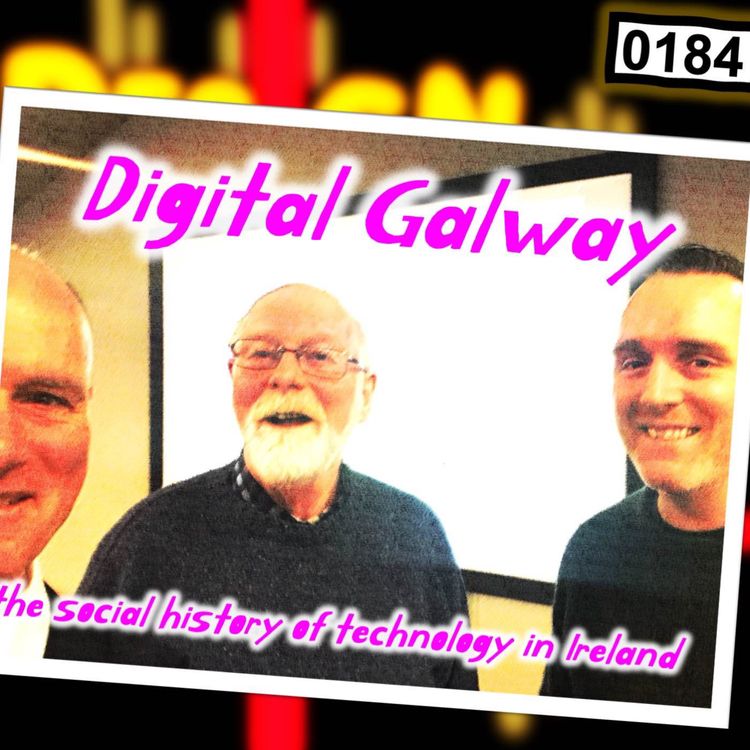
Design Talk (dot IE)
0184 - Digital Galway with John Sterne
Hosts: David Heskin and Allen Higgins
We are very pleased to have John Sterne, a technology journalist, historian and digital archivist, long involved in recording the social history of technology in Ireland: writing books, articles, press and online on the website techarchives.irish.
John, can we start by telling us a little about yourself and your vision for techarchives.irish?
So, today’s conversation, hopefully the first of many, we want to look at multiplier effects and spill-over benefits of having subsidiaries of multinational firms in based in your country.
To test these ideas, we are going back 30 years or so to when Digital came to Ireland. By Digital we mean the company, also known as DEC or Digital Equipment Corporation.
· Let’s start with the DEC story, who were the main actors at the time?
· Was DEC’s corporate culture different to its peers? (The distinctive culture inside a corporation run by 20th century engineers – not by investors or accountants)
· And DEC’s products, did they deserve their reputation for innovation?
· How did Galway City, the West of Ireland, end up as the home for DEC’s European manufacturing operations centre?
· How many sites did DEC end up having in Ireland and what kinds of work were the Irish sites involved in?
· How did DEC interact with the corporate and political scene in Ireland and Europe?
· Was there a tradition of entrepreneurial talent emerging from DEC during the good years?
· And then we arrive at 1993, DEC closes its Irish assembly plants after 22 years of operation. It must have been devastating…
· A lot has been written positing the resilience and value of “Industrial Clusters”. What lessons were learnt in the wake of DEC’s closure?
· And what did Digital itself think? What was the corporate view on reflection some years after the experience?
· <questions from the audience>
Well, John, we’ll wrap up there.
Thank you for taking the time to talk and for sharing your knowledge. Let’s do this again and continue the conversation…
Notes:
https://techarchives.irish/
Acknowledgements
Music
Title: Voltaic Fluctuations
Artist: Ben Prunty
Source: https://www.benpruntymusic.com/
License: Non-transferable license. Permission granted by Ben Prunty
Cover Art
Title: Complex collage
Artist: Allen Higgins
Source: vignette_version.pptx
License: CC BY-NC-SA 4.0
Podcast License
Design Talk (dot IE) CC BY-NC-SA 4.0
The license can be viewed at https://creativecommons.org/licenses/by-nc-sa/4.0
By taking part you give permission for your voice to be recorded, for the recording to be edited, and for it to be posted and published as a podcast.
More episodes
View all episodes
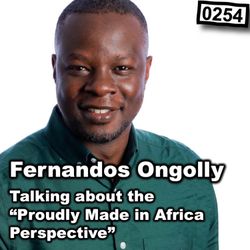
254. 0254 - The PMIA Perspective with Fernandos Ongolly
56:14||Season 13, Ep. 254Today we’re talking with Fernandos Ongolly, to learn about home-grown innovations and digital startups from The Continent – in this case, Africa. Our hosts are Selma Anya, Safa A. A. Emam, and Diana Achiro, students on the MSc Digital Innovation programme.Fernandos has a PhD from UCD. He is the current “Proudly Made in Africa” Fellow in Business and Development at UCD College of Business, and the founder of – Non-EU Academics and Researchers Community in Ireland.Our audience is the class of 2025 studying the Outsourcing and Offshoring module taught by Allen Higgins.First, Fernandos, would you like to say a few words about your current role and a little about your journey?· African nations might not be the first place that investors and business associate with “technology ambition”, can you set the context? [notes: technical infrastructure, physical infrastructure, population demographics, connectedness etc.]· Talk about some success stories from Africa and the sectors they occur in? [notes: in FinTech, Education, AgriTech and eCommerce]· What are the opportunities for outsourcing to Africa? [notes: BPO, content moderation and specialized services, much of today’s AI is/was trained by centers in Africa]· For the startup environment, like Silicon Valley, where are the incubators, clusters, and centers of excellence? [notes: the three big regions East, West and South – Kenya; Nigeria; South Africa]· Can you talk about the role culture plays. No doubt there are challenges but opportunities too? [notes: strong social ties, high-trust cultures, entrepreneurial attitude is prevalent – trading is a way of life]· Questions from the hosts· Questions from the audience.Further reading and notesFernandos Ongolly on LinkedIn - https://www.linkedin.com/in/fernandos-ongolly-phd-89927b32/Proudly Made in Africa is a Trade Justice and Global Citizenship Education organization. For more see - https://www.proudlymadeinafrica.orgAlso, the PMIA Podcast on YouTube - https://www.youtube.com/@proudlymadeinafricaAcknowledgementsMusic Title: Faceplant with UK GarageArtist: Allen HigginsSource: a-Wed23Oct2024License: CC BY-NC-SA 4.0. Includes samples from Ableton Live by Ableton AG and by KORG Inc.Cover Art Title: Guest and classArtist: Allen HigginsSource: Pepperdine_Fernandos.pptxLicense: CC BY-NC-SA 4.0Podcast LicenseDesign Talk (dot IE) CC BY-NC-SA 4.0 The license can be viewed at https://creativecommons.org/licenses/by-nc-sa/4.0By taking part, you give permission for your voice to be recorded, for the recording to be edited, and for it to be posted and published as a podcast.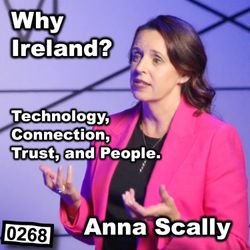
268. 0268 - Why Ireland? with Anna Scally
50:11||Season 13, Ep. 268Our guest for this session is Anna Scally - Partner and Head of Technology Media & Telecoms, KPMG in Ireland and EMA KPMG in Ireland. This is the third of 3 seminars organised by John Mooney as part of the Pepperdine Graziadio Business School MBA programme in collaboration with UCD’s MSc Digital Innovation programme.Anna gave a masterclass intro to corporate taxation in Ireland and its relationship with global trade (focus on technology companies). Yes, we need to talk about Trade, Tariffs, and Taxes, but the answers revolve around Technology, Connection, Trust, and People.Notes:Anna’s profile pages on KPMG.com (link) and LinkedIn (link)For more about the KPMG Global Tech Innovation competition 2025 (link)Washington National Tax (WNT); the KPMG think tank and technical core of KPMG’s U.S. tax practice. (link)Anna sits on the Advisory Board of Scale Ireland - https://www.scaleireland.com - Scale Ireland is Ireland’s leading independent not-for-profit, representative organisation for Irish tech start-up and scaling companies.IDA Ireland (the Ireland Development Authority) - http://idaireland.com - (Irish: An Ghníomhaireacht Forbartha Tionscail) is the agency responsible for the attraction and retention of inward foreign direct investment (FDI) into Ireland.Enterprise Ireland - https://www.enterprise-ireland.com/en/ - EI invests in and supports the development of Irish-owned companies “on their journey to achieving greater scale and to become global leaders in their field.” Revenue - Irish Tax and Customs – https://www.revenue.ie/ - The Tax Relief Scheme for Capital Expenditure on Intangible Assets (S. 291A) – (link)WTO landing page for learning about Tariffs –(link) AcknowledgementsMusic Title: First TakeArtist: Debajyoti Biswas and Michael O'NeillSource: mis.aup3License: CC BY-NC-SA 4.0Cover Art Title:(Screenshot from KPMG Platform – Global Tech Innovation 2024 launch event.)Artist: Allen HigginsSource: Pepperdine_AnnaScally.pptxLicense: CC BY-NC-SA 4.0Podcast LicenseDesign Talk (dot IE) CC BY-NC-SA 4.0 The license can be viewed at https://creativecommons.org/licenses/by-nc-sa/4.0By taking part, you give permission for your voice to be recorded, for the recording to be edited, and for it to be posted and published as a podcast.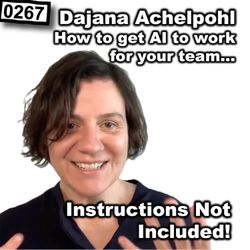
267. 0267 - Instructions Not Included with Dajana Achelpohl
49:11||Season 13, Ep. 267Our guest for this session is Dajana Achelpohl. Dajana heads up AI Change Maker and is an alum of Google & PayPal. The second of 3 seminars organised by John Mooney as part of the Pepperdine Graziadio Business School MBA programme in collaboration with UCD’s MSc Digital Innovation programme.Notes:AI Change Maker - https://www.aichangemaker.comDajana on LinkedIn - https://www.linkedin.com/in/dajana-achelpohl/On other media:Dajana Achelpohl’s talk with Audrey Chia “A Framework for AI-Ready Teams” (YouTube link)From AI Ireland: ‘Demystifying AI: Practical Applications and Business Integration’ with Google’s Dajana Achelpohl (link)AcknowledgementsMusic Title: First TakeArtist: Debajyoti Biswas and Michael O'NeillSource: mis.aup3License: CC BY-NC-SA 4.0Cover Art Title: Instructions Not Included! (screenshot from Dajana’s talk with Audrey Chia on YouTube)Artist: Allen HigginsSource: Pepperdine_Dajana.pptxLicense: CC BY-NC-SA 4.0 Podcast LicenseDesign Talk (dot IE) CC BY-NC-SA 4.0 The license can be viewed at https://creativecommons.org/licenses/by-nc-sa/4.0By taking part, you give permission for your voice to be recorded, for the recording to be edited, and for it to be posted and published as a podcast.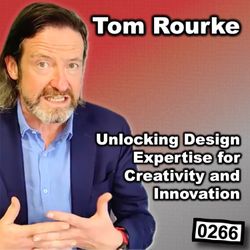
266. 0266 - Unlocking Design Expertise with Tom Rourke
52:33||Season 13, Ep. 266Our guest for this session is Tom Rourke. Tom works in Kyndryl as Vice President for Design, Insights and Innovation. The first of 3 seminars organised by John Mooney as part of the Pepperdine Graziadio Business School MBA programme in collaboration with UCD’s MSc Digital Innovation programme.Notes:Tom Rourke – LinkedIn profile: https://www.linkedin.com/in/tom-rourke-1a8b70/Tom gave a shoutout to Kevin Bethune - https://www.kevinbethune.comAlso, the MRI design story by Doug Dietz, Industrial Designer – (link)Also, Tom co-hosts The Progress Report, with Sarah B. Nelson (Chief Design Officer at Kyndryl) on:Apple Podcasts - https://podcasts.apple.com/ie/podcast/the-progress-report/id1627095388Spotify - https://open.spotify.com/show/23hDHHDkOPSeFrrNsa9jcD?si=fa531ad1ec36459bFinally, The Kyndryl Institute (download the app) - https://www.kyndryl.com/gb/en/institute/AcknowledgementsMusic Title: First TakeArtist: Debajyoti Biswas and Michael O'NeillSource: mis.aup3License: CC BY-NC-SA 4.0Cover Art Title: Unlocking Design (screenshot from Tom in Kyndryl leadership video)Artist: Allen HigginsSource: Pepperdine_Tom.pptxLicense: CC BY-NC-SA 4.0 Podcast LicenseDesign Talk (dot IE) CC BY-NC-SA 4.0 The license can be viewed at https://creativecommons.org/licenses/by-nc-sa/4.0By taking part you give permission for your voice to be recorded, for the recording to be edited, and for it to be posted and published as a podcast.
265. 0265 - Siobhain Duggan on Learning from Leaders
54:07||Season 13, Ep. 265Hosted by Brona RussellWe are delighted to have Siobhain Duggan, CEO of GS1 Ireland in to talk to the first year Economics & finance Organisation Behaviour class today. The interview/podcast is being hosted by UCD’s first year Economics and Finance class as part of the Professional and Academic Development module. Our focus is on the human aspects of organising in corporate settings, recognising the role of human behaviour in determining organisational effectiveness.Welcome Siobhain. So, it would be great to hear first about GS1 and what the work that you do. Then to understand your own career journey and how it has evolved over time: · Your readiness to take opportunities as they presented themselves. · Who were your mentors, and how did they help shape your career?And regarding your current role:· What motivated you to step up and to take on the CEO role in GS1?· What are some of the biggest challenges you have faced, and how did you persevere through them?· How has your leadership style evolved since you took on the role?· What do you maintain a healthy work-life balance juggling work and travel and family?And your thoughts in general on:· What are the most important qualities you look for in a future employee?· How important is diversity and inclusion to you as a CEO trying to encourage creativity and innovation?· How do you foster open communication and a positive work environment?· How do you foster a spirit of collaboration in your organisation?Before we finish, is there anything further you'd like to add?We’ll wrap it up there. Thank you so much for your time and for sharing your thoughts and experience with us today. Notes, extra questions, and further reading, books, blogs, pods, articles?Siobhain Duggan, CEO - GS1 Ireland - https://www.gs1ie.org/Siobhain on LinkedIn - https://www.linkedin.com/in/siobhainduggan/The UCD BSc Business and Economics programme (link)Article: Keeping track of the COVID-19 vaccine (HSE, 2022: link) AcknowledgementsMusic Title: ImpulseArtist: Ben PruntySource: https://www.benpruntymusic.com/License: Non-transferable license. Permission granted by Ben Prunty (personal letter) Cover Art Title: Pod-CoverArtist: Allen Higgins (photo used with permission)Source: Duggan_GS1.pptxLicense: CC BY-NC-SA 4.0 Podcast LicenseDesign Talk (dot IE) CC BY-NC-SA 4.0 The license can be viewed at https://creativecommons.org/licenses/by-nc-sa/4.0By taking part, you give permission for your voice to be recorded, for the recording to be edited, and for it to be posted and published as a podcast.
264. 0264 - Navigating Risk with Peter Cripwell
40:41||Season 13, Ep. 264Our hosts are Diarmuid Murphy and Leo CuddiganWelcome to the UCD Economics and Finance class. We are delighted to have Peter Cripwell, CEO at RiskSystem, in to talk to us today about Risk Analytics and Risk Reporting and the value of knowing a bit about programming.To start, Peter, can you tell us how you went from Nuclear Physicist to CEO of RiskSystem.· Can you give us a demo of what Risk Reporting as a service looks like· What technology do you use to design and build the product?· How do I get the most out of RiskSystem?· Do you think risk models are becoming too complex?· Where do you see AI fitting into the business?· With the time left we’d like to open it to questions from the audience…Before we finish, is there anything further you'd like to add?We’ll wrap it up there. Thank you so much for your time and for sharing your thoughts and experience with us today. Notes, extra questions, and further reading, books, blogs, pods, articles?RiskSystem - https://www.risksystem.comPeter on LinkedIn - https://www.linkedin.com/in/peter-cripwell-a2258b6/Highly recommended reading- Sparklines History by Edward Tufte: 1324 to Now - https://www.edwardtufte.com/notebook/sparklines-history-by-tufte-1324-to-now/ AcknowledgementsMusic Title: First TakeArtist: Debajyoti Biswas and Michael O'NeillSource: mis.aup3License: CC BY-NC-SA 4.0 Cover Art Title: Class vignetteArtist: Allen HigginsSource: RiskSystem_Peter.pptxLicense: CC BY-NC-SA 4.0 Podcast LicenseDesign Talk (dot IE) CC BY-NC-SA 4.0 The license can be viewed at https://creativecommons.org/licenses/by-nc-sa/4.0By taking part you give permission for your voice to be recorded, for the recording to be edited, and for it to be posted and published as a podcast.
263. 0263 - Learning from the London Whale with Denis McCarthy
37:06||Season 13, Ep. 263Welcome to the Economics and Finance class.Our hosts are Daksh Wadhwa and Peter Barrett. Today, we are very pleased to welcome Denis McCarthy, Head of Financial Risk Model Development at AIB.Thank you for coming in to speak to us today. Can you tell us a little about yourself and your journey into financial risk modelling?· What does a day in the week look like on your team? [for a finance/economist, quant analyst, programmer]· How can a large organisation manage end-user tools like Excel? [policy, practices, systems management…]· Much of the focus is on the technical characteristics and the actions of individuals but not so much on organisational cultural. How can we address the organisational culture angle? [for example, grow and protect a culture of dissent? What might that look like?]· What about review processes and how to avoid undue influence from one or other actors? [maybe relate to audit trails, version control]· Are our models becoming too complex? [to either understand fully or to apply in a timely manner? What kinds of new systemic risk do you think about?]· Is sentiment analysis applied much to risk measurement? [how to do it? gotchas and the dark art of automated textual analysis for gauging sentiment from company filings, conference call transcripts and other bulk sources]Questions from the audience?Before we finish, is there anything further you'd like to add?Thank you so much for your time and for sharing your thoughts with us today. Further reading: Articles, links etc.LinkedIn - https://www.linkedin.com/in/denis-mccarthy-69970b2b/ AcknowledgementsMusic Title: Voltaic FluctuationsArtist: Ben PruntySource: https://www.benpruntymusic.com/License: Non-transferable license. Permission granted by Ben Prunty Cover Art Title: Complex collageArtist: Allen HigginsSource: vignette_version.pptxLicense: CC BY-NC-SA 4.0 Podcast LicenseDesign Talk (dot IE) CC BY-NC-SA 4.0 The license can be viewed at https://creativecommons.org/licenses/by-nc-sa/4.0By taking part, you give permission for your voice to be recorded, for the recording to be edited, and for it to be posted and published as a podcast.
262. 0262 - From Grid to Dialogue with David Sammon
49:45||Season 13, Ep. 262Hosted by Christina Philips and Anabela Da Silva Filipe Soares.Welcome to today’s seminar by David Sammon from UCC, Cork University Business School.In this session David Sammon from University College Cork talks about his approach to unlocking the value of the 2x2 Matrix in the classroom. David is co-Founder of the Data Value Innovation Group, whose mission is helping organisations to deliver value from their data through data value mapping. The Data Value Map (http://datavaluemap.com) offers resources for visual discursive organisational analysis and facilitation to build shared understanding around data initiatives.Further reading, sources, mentions and acknowledgements.David’s homepage at UCC - https://www.cubsucc.com/faculty-directory/dr-david-sammon/AcknowledgementsMusic Title: Guitar HouseArtist: josh pan (2020)Source: https://www.youtube.com/watch?v=JL-LId8ZWBMLicense: License CC BY 3.0Cover Art Title: Complex collaboration for BAEFArtist: Nuno Machado and Allen HigginsSource: vignette_version.pptxLicense: CC BY-NC-SA 4.0Podcast LicenseDesign Talk (dot IE) CC BY-NC-SA 4.0 The license can be viewed at https://creativecommons.org/licenses/by-nc-sa/4.0By taking part you give permission for your voice to be recorded, for the recording to be edited, and for it to be posted and published as a podcast.
261. 0261 - Data Practices with Hippolyte Lefebvre
28:51||Season 13, Ep. 261Welcome to the CITO Podcast.Séamas Kelly invites Hippolyte Lefebvre to present an overview of his research interests and direction. Hippolyte is a member of CITO and the Management Information Systems group in the UCD College of Business, Dublin, and previously at the Université de Lausanne, Switzerland.Notes, extra questions, and further reading:Homepage at UCD - https://people.ucd.ie/hippolyte.lefebvreAnd Google scholar page linkAcknowledgementsMusic Title: Justice Little LeagueArtist: Ema GraceSource: https://bit.ly/2tJ6BndLicense: CC BY 4.0Artist notes: Ema Grace is an AI vocaloid produced by Ryoma MAEDA (@Ryoma_Maeda). Styled as virtual Singer&Idol 架空のバーチャルアイドル & シンガー、それがEma Grace.Cover Art Title: Inspired by selfie and AIArtist: Allen HigginsSource: CITO-podcast-DataPractices.pptxLicense: CC BY-NC-SA 4.0Podcast LicenseDesign Talk (dot IE) CC BY-NC-SA 4.0 The license can be viewed at https://creativecommons.org/licenses/by-nc-sa/4.0By taking part you give permission for your voice to be recorded, for the recording to be edited, and for it to be posted and published as a podcast.